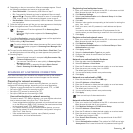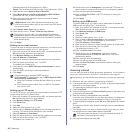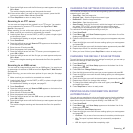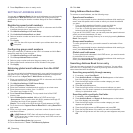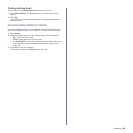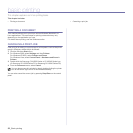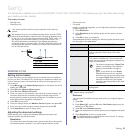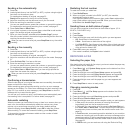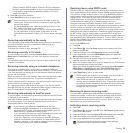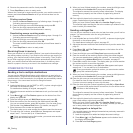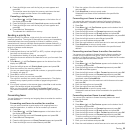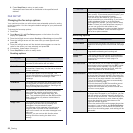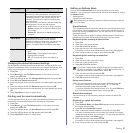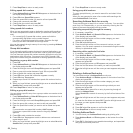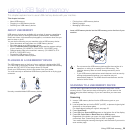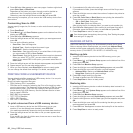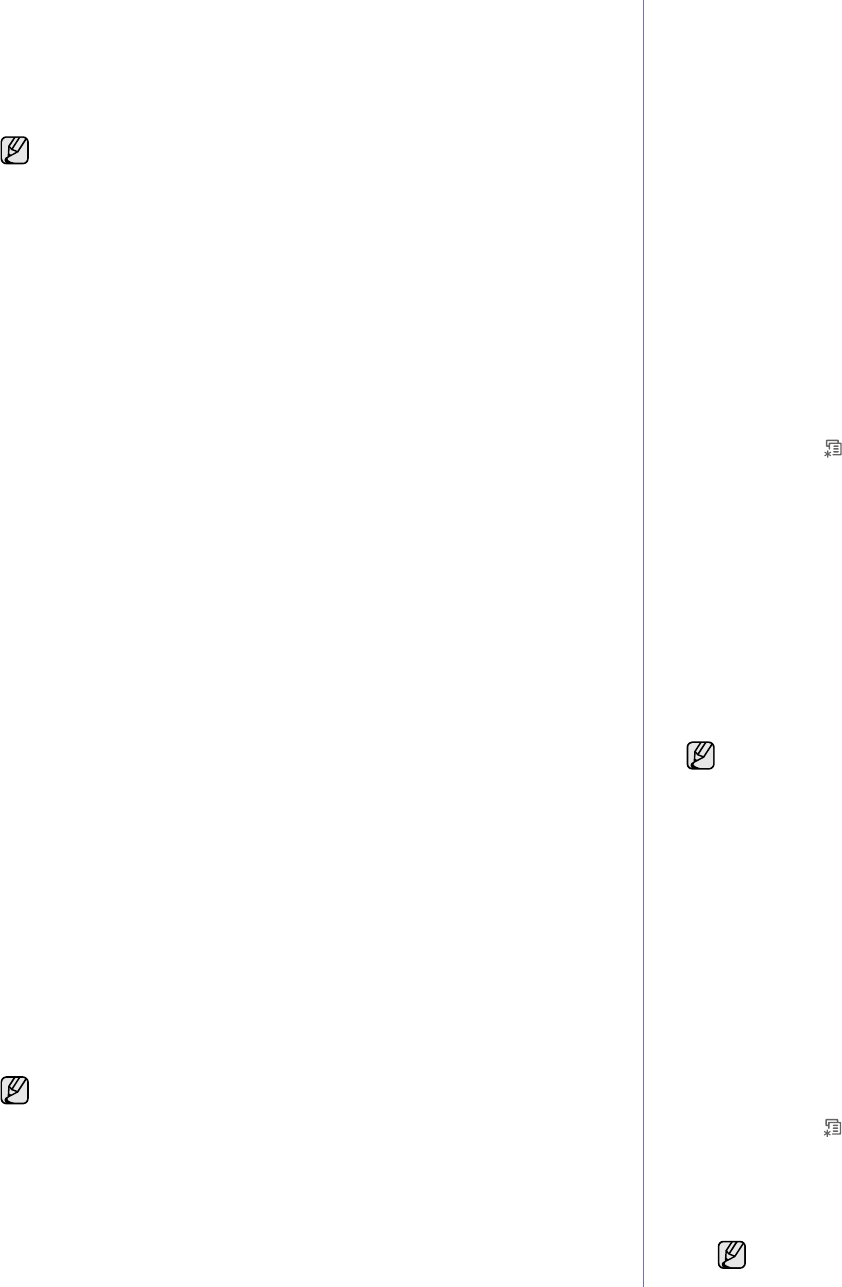
Faxing_53
Pattern Detection (DRPD) feature. Distinctive Ring is a telephone
company service which enables an user to use a single telephone
line to answer several different telephone numbers. For further
details, see page 53.
6. Press
OK
to save your selection.
7. Press Stop/Clear to return to ready mode.
Receiving automatically in Fax mode
Your machine is preset to Fax mode at the factory. When you receive a fax,
the machine answers the call on a specified number of rings and
automatically receives the fax.
To change the number of rings,
see page 56.
Receiving manually in Tel mode
You can receive a fax call by pressing On Hook Dial and then pressing
Black Start or Color Start
when you hear a fax tone from the remote
machine.
The machine begins receiving a fax and returns to ready mode when the
reception is completed.
Receiving manually using an extension telephone
This features works best when you are using an extension telephone
connected to the EXT socket on the back of your machine. You can receive
a fax from someone you are talking to on the extension telephone without
going to the fax machine.
When you receive a call on the extension phone and hear fax tones, press
the keys *9* on the extension phone. The machine receives the fax.
Press the buttons slowly in sequence. If you still hear the fax tone from the
remote machine, try pressing *9* once again.
*9* is the remote receive code preset at the factory. The first and the last
asterisks are fixed, but you can change the middle number to whatever you
wish. For details about changing the code, see page
56.
Receiving automatically in Ans/Fax mode
To use this mode, you must attach an answering machine to the EXT socket
on the back of your machine.
If the caller leaves a message, the answering machine stores the message
as it would normally. If your machine detects a fax tone on the line, it
automatically starts to receive the fax.
Receiving faxes using DRPD mode
Distinctive Ring is a telephone company service which enables an user to
use a single telephone line to answer several different telephone numbers.
The particular number someone uses to call you is identified by different
ringing patterns, which consist of various combinations of long and short
ringing sounds. This feature is often used by answering services who
answer telephones for many different clients and need to know which
number someone is calling in on to properly answer the phone.
Using the Distinctive Ring Pattern Detection (DRPD) feature, your fax
machine can learn the ring pattern you designate to be answered by the fax
machine. Unless you change it, this ringing pattern will continue to be
recognized and answered as a fax call, and all other ringing patterns will be
forwarded to the extension telephone or answering machine plugged into
the EXT socket. You can easily suspend or change DRPD at any time.
Before using the DRPD option, Distinctive Ring service must be installed on
your telephone line by the telephone company. To set up DRPD, you will
need another telephone line at your location, or someone available to dial
your fax number from outside.
To set up the DRPD mode:
1. Press Fax.
2. Press Menu () until Fax Setup appears on the bottom line of the
display and press
OK
.
3. Press the left/right arrow until Receiving appears and press
OK
.
4. Press the left/right arrow until DRPD Mode appears and press
OK
.
Waiting Ring appears on the display.
5. Call your fax number from another telephone. It is not necessary to
place the call from a fax machine.
6. When your machine begins to ring, do not answer the call. The machine
requires several rings to learn the pattern.
When the machine completes learning, the display shows Completed
DRPD Setup. If the DRPD setup fails, Error DRPD Ring appears.
Press
OK
when DRPD Mode appears and start over from step 4.
7. Press Stop/Clear to return to ready mode.
Receiving in secure receiving mode
You may need to prevent your received faxes from being accessed by
unauthorized people. You can turn on secure receiving mode to restrict
printing of received faxes when the machine is unattended. In secure
receiving mode, all incoming faxes go into memory. When the mode is
deactivated, any stored faxes are printed.
Activating secure receiving mode
1. Press Fax.
2. Press Menu () and then press
OK
when Fax Feature appears on the
bottom line of the display.
3. Press the left/right arrow until Secure Receive appears and press
OK
.
4. Press the left/right arrow until On appears and press
OK
.
5. Enter a four-digit password you want to use and press
OK
.
• When the memory is full, the printer can no longer receive any
incoming fax. Secure free memory to resume by removing data
stored in the memory.
• To use the Ans/Fax mode, attach an answering machine to
the
EXT socket on the back of your machine.
• If you do not want other people to view your received documents,
you can use secure receiving mode. In this mode, all of the
received faxes are stored in memory. For further details, see page
53.
• If you have set your machine to Ans/Fax mode and your
answering machine is switched off, or no answering machine
is
connected to EXT socket, your machine automatically goes
into
Fax mode after a predefined number of rings.
• If your answering machine has a user-selectable ring counter,
set
the machine to answer incoming calls within 1 ring.
• If you are in Tel mode (manual reception) when the answering
machine is connected to your machine, you must switch off the
answering machine, or the outgoing message from the answering
machine will interrupt your phone conversation.
• DRPD must be set up again if you re-assign your fax number,
or
connect the machine to another telephone line.
• After DRPD has been set up, call your fax number again to
verify
that the machine answers with a fax tone. Then have a call placed
to a different number assigned to that same line to
be sure the call
is forwarded to the extension telephone or answering machine
plugged into the EXT socket.
You can activate secure receiving mode without setting a
password, but cannot protect your faxes.



